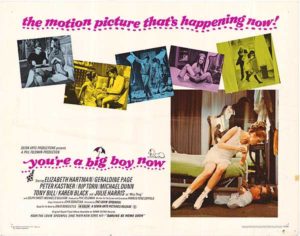Ignored Obscured Restored
Today’s post is the next installment in my series on rock music in films. The last in the series covered rock in ‘60s psychedelic movies. It was largely centered on soundtracks that included performances by rock bands. Today’s post focuses on movie soundtracks written and performed by rock acts.
One of the best movies of the ‘60s was The Graduate (1967), starring a young Dustin Hoffman. Directed by Mike Nichols, with a screenplay by Buck Henry and Calder Willingham, and also starring Anne Bancroft and Katherine Ross, it was a coming of age story and a box office smash. The hip vibe of the flick was aided by the soundtrack by Simon and Garfunkel.
The soundtrack recycled several songs from the first couple of Simon and Garfunkel albums that perfectly reflected the mood of the scenes that used them. But there was one original, the major hit “Mrs. Robinson.” This is the soundtrack version, not the hit that was on Bookends.
A year earlier, Francis For Coppola hired The Lovin’ Spoonful to provide the soundtrack to You’re A Big Boy Now. Interestingly, YABBN tackled a subject very similar to The Graduate – a young man engaged in an affair with an older woman.
“Darling Be Home Soon” is a beautiful song that was covered with a gospel feel by Joe Cocker and was previously featured as a SotW.
The Spoonful also provided the soundtrack for Woody Allen’s What’s Up, Tiger Lily? (1967).
There was a trio of films with notable rock soundtracks that came out in 1971:
Harold & Maude – Cat Stevens
Friends – Elton John
Percy – The Kinks
Like The Graduate soundtrack, Harold & Maude’s reused tracks from early Cat Stevens albums supplemented with some new material. The most famous of the two new songs – “If You Want to Sing Out, Sing Out” – was a SotW in August 2013, so let’s hear the other – “Don’t Be Shy.”
Elton John was considered for the role of Harold and was instrumental in connecting director Hal Ashby with Stevens.
Friends was John’s release between Tumbleweed Connection and Madman Across the Water.
“Friends” made it into the Billboard Top 40 and the soundtrack was nominated for a Grammy in 1972 for Best Original Score Written for a Motion Picture. Despite those accolades, the Friends soundtrack album didn’t sell and could be found in the cut-out bins for a couple of bucks for years.
The strangest of these 1971 soundtracks was for Percy, by the Kinks.
“The Way Love Used to Be” is the best of the lot and was later included on The Great Lost Kinks Album (1973). But it must be difficult writing songs for a story that is about a guy named Edwin that loses his penis when a man falls from the sky and lands on him. When he gets a penis transplant, he names it Percy.
All of these soundtracks set the stage for rock music to be used to score films in the years to come. A few examples of outstanding soundtracks by rock musicians are:
Mark Knopfler – Princess Bride
Queen – Flash Gordon
Richard Thompson – Grizzly Man
Ry Cooder – Paris, Texas
Peter Gabriel – Last Temptation of Christ
Enjoy… until next week.

 John Sebastian wrote “Darling Be Home Soon” for the soundtrack to Francis Ford Coppola’s 1966 film You’re a Big Boy Now, while still with The Lovin’ Spoonful.
John Sebastian wrote “Darling Be Home Soon” for the soundtrack to Francis Ford Coppola’s 1966 film You’re a Big Boy Now, while still with The Lovin’ Spoonful.